MED1133: A Critical Analysis of Curriculum & Pedagogy Models
VerifiedAdded on 2023/06/18
|8
|2580
|408
Report
AI Summary
This report presents a critical analysis of curriculum and pedagogy, focusing on the Cambridge International School model. It examines curriculum principles, models such as the subject-centered approach, and the application of essentialism philosophy. The analysis includes a review of content, curriculum standards, limitations, and implications. The report also offers recommendations for improvement, such as incorporating learner-centered approaches and perennialism philosophy, as well as enhancing monitoring and feedback mechanisms. The aim is to provide insights into improving educational practices and outcomes within the Cambridge framework. Desklib provides a platform for students to access similar solved assignments and past papers.
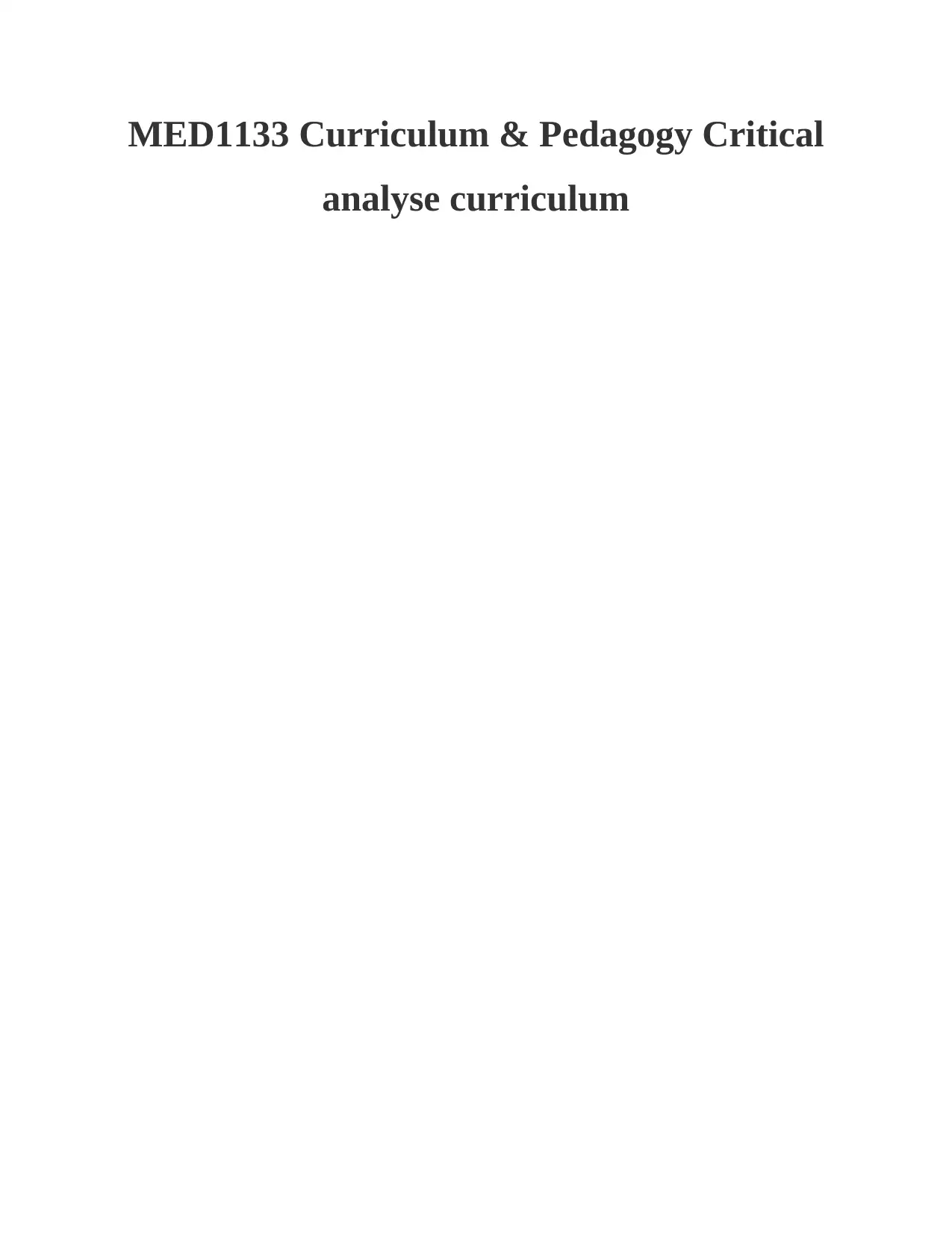
MED1133 Curriculum & Pedagogy Critical
analyse curriculum
analyse curriculum
Paraphrase This Document
Need a fresh take? Get an instant paraphrase of this document with our AI Paraphraser
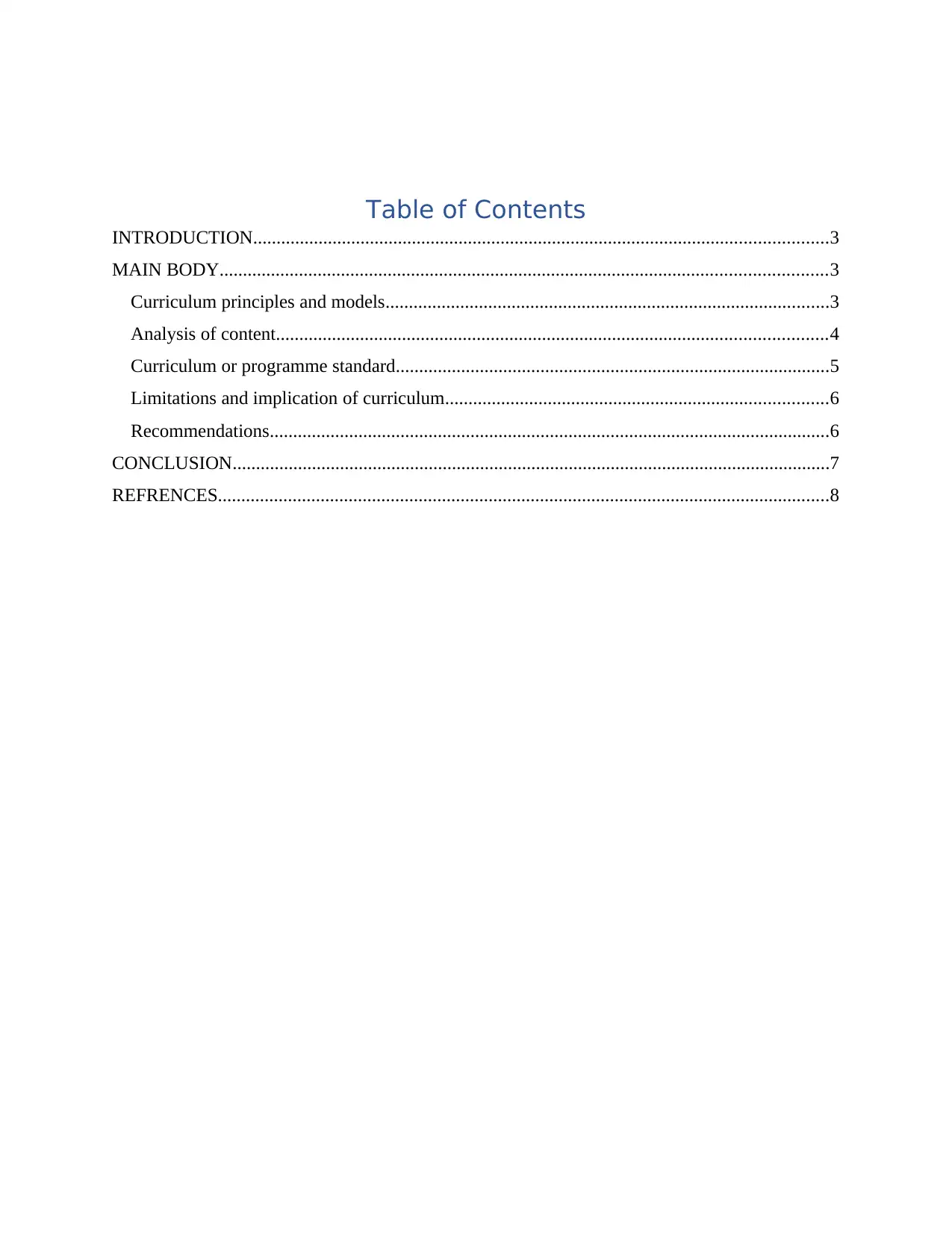
Table of Contents
INTRODUCTION...........................................................................................................................3
MAIN BODY..................................................................................................................................3
Curriculum principles and models...............................................................................................3
Analysis of content......................................................................................................................4
Curriculum or programme standard.............................................................................................5
Limitations and implication of curriculum..................................................................................6
Recommendations........................................................................................................................6
CONCLUSION................................................................................................................................7
REFRENCES...................................................................................................................................8
INTRODUCTION...........................................................................................................................3
MAIN BODY..................................................................................................................................3
Curriculum principles and models...............................................................................................3
Analysis of content......................................................................................................................4
Curriculum or programme standard.............................................................................................5
Limitations and implication of curriculum..................................................................................6
Recommendations........................................................................................................................6
CONCLUSION................................................................................................................................7
REFRENCES...................................................................................................................................8
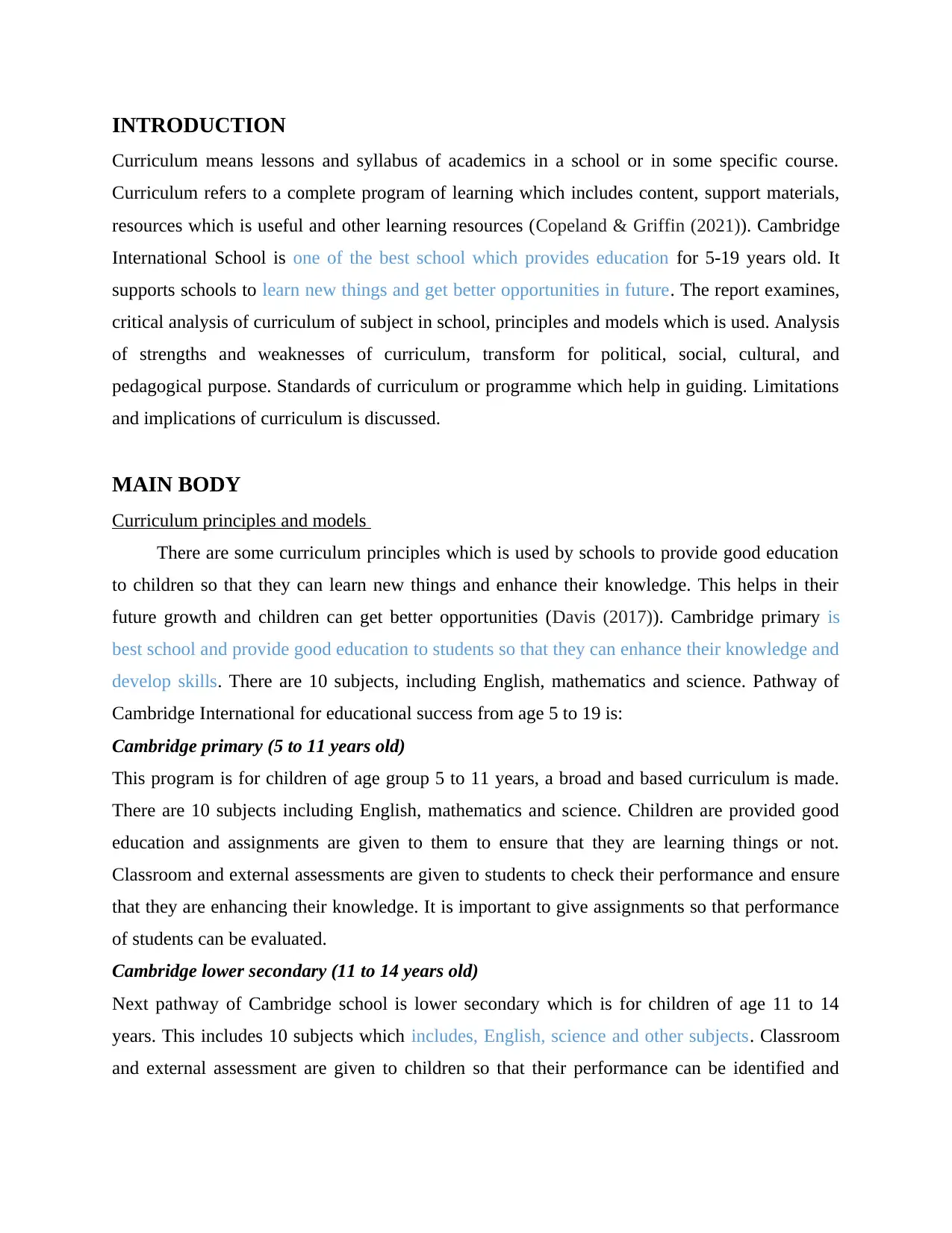
INTRODUCTION
Curriculum means lessons and syllabus of academics in a school or in some specific course.
Curriculum refers to a complete program of learning which includes content, support materials,
resources which is useful and other learning resources (Copeland & Griffin (2021)). Cambridge
International School is one of the best school which provides education for 5-19 years old. It
supports schools to learn new things and get better opportunities in future. The report examines,
critical analysis of curriculum of subject in school, principles and models which is used. Analysis
of strengths and weaknesses of curriculum, transform for political, social, cultural, and
pedagogical purpose. Standards of curriculum or programme which help in guiding. Limitations
and implications of curriculum is discussed.
MAIN BODY
Curriculum principles and models
There are some curriculum principles which is used by schools to provide good education
to children so that they can learn new things and enhance their knowledge. This helps in their
future growth and children can get better opportunities (Davis (2017)). Cambridge primary is
best school and provide good education to students so that they can enhance their knowledge and
develop skills. There are 10 subjects, including English, mathematics and science. Pathway of
Cambridge International for educational success from age 5 to 19 is:
Cambridge primary (5 to 11 years old)
This program is for children of age group 5 to 11 years, a broad and based curriculum is made.
There are 10 subjects including English, mathematics and science. Children are provided good
education and assignments are given to them to ensure that they are learning things or not.
Classroom and external assessments are given to students to check their performance and ensure
that they are enhancing their knowledge. It is important to give assignments so that performance
of students can be evaluated.
Cambridge lower secondary (11 to 14 years old)
Next pathway of Cambridge school is lower secondary which is for children of age 11 to 14
years. This includes 10 subjects which includes, English, science and other subjects. Classroom
and external assessment are given to children so that their performance can be identified and
Curriculum means lessons and syllabus of academics in a school or in some specific course.
Curriculum refers to a complete program of learning which includes content, support materials,
resources which is useful and other learning resources (Copeland & Griffin (2021)). Cambridge
International School is one of the best school which provides education for 5-19 years old. It
supports schools to learn new things and get better opportunities in future. The report examines,
critical analysis of curriculum of subject in school, principles and models which is used. Analysis
of strengths and weaknesses of curriculum, transform for political, social, cultural, and
pedagogical purpose. Standards of curriculum or programme which help in guiding. Limitations
and implications of curriculum is discussed.
MAIN BODY
Curriculum principles and models
There are some curriculum principles which is used by schools to provide good education
to children so that they can learn new things and enhance their knowledge. This helps in their
future growth and children can get better opportunities (Davis (2017)). Cambridge primary is
best school and provide good education to students so that they can enhance their knowledge and
develop skills. There are 10 subjects, including English, mathematics and science. Pathway of
Cambridge International for educational success from age 5 to 19 is:
Cambridge primary (5 to 11 years old)
This program is for children of age group 5 to 11 years, a broad and based curriculum is made.
There are 10 subjects including English, mathematics and science. Children are provided good
education and assignments are given to them to ensure that they are learning things or not.
Classroom and external assessments are given to students to check their performance and ensure
that they are enhancing their knowledge. It is important to give assignments so that performance
of students can be evaluated.
Cambridge lower secondary (11 to 14 years old)
Next pathway of Cambridge school is lower secondary which is for children of age 11 to 14
years. This includes 10 subjects which includes, English, science and other subjects. Classroom
and external assessment are given to children so that their performance can be identified and
⊘ This is a preview!⊘
Do you want full access?
Subscribe today to unlock all pages.

Trusted by 1+ million students worldwide
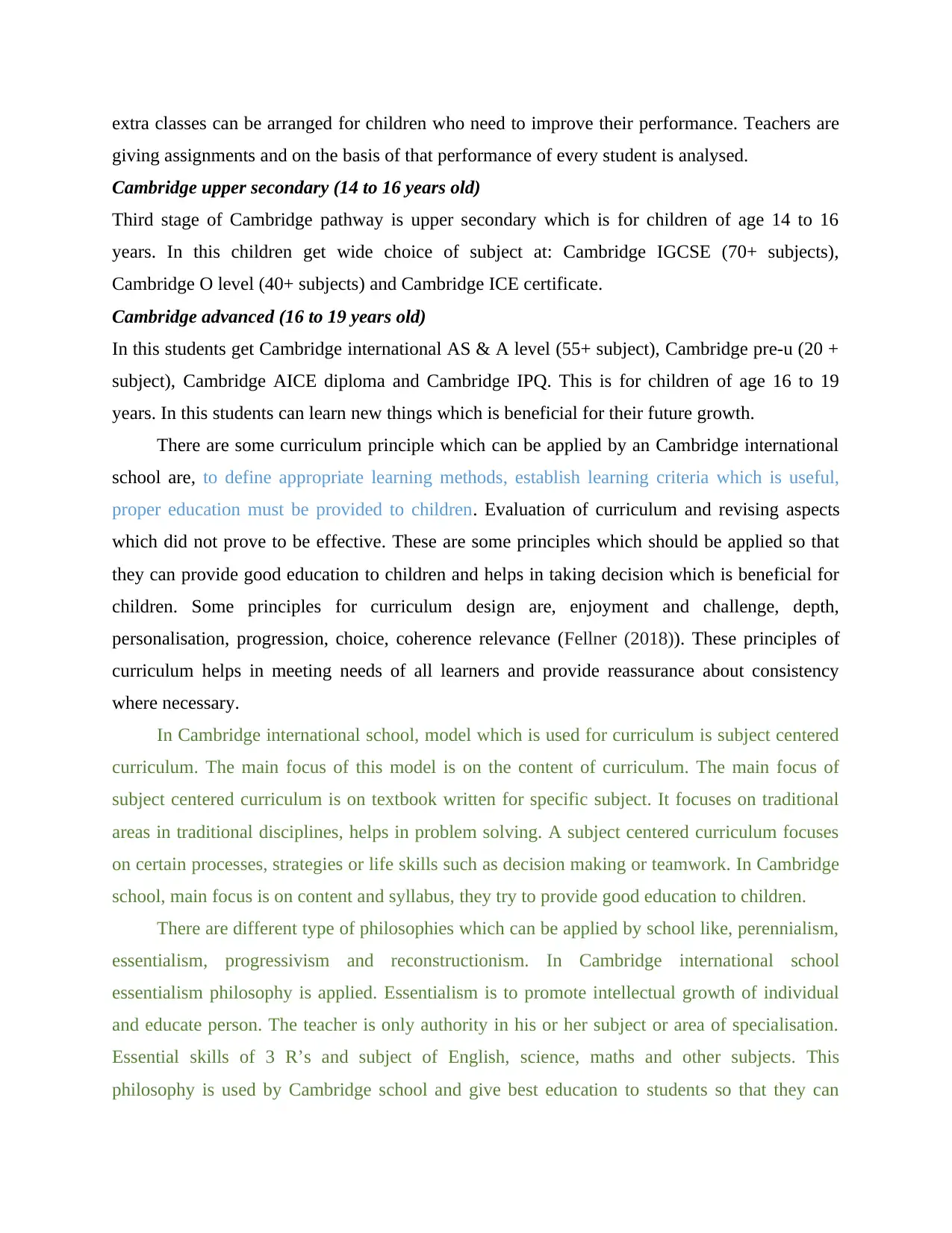
extra classes can be arranged for children who need to improve their performance. Teachers are
giving assignments and on the basis of that performance of every student is analysed.
Cambridge upper secondary (14 to 16 years old)
Third stage of Cambridge pathway is upper secondary which is for children of age 14 to 16
years. In this children get wide choice of subject at: Cambridge IGCSE (70+ subjects),
Cambridge O level (40+ subjects) and Cambridge ICE certificate.
Cambridge advanced (16 to 19 years old)
In this students get Cambridge international AS & A level (55+ subject), Cambridge pre-u (20 +
subject), Cambridge AICE diploma and Cambridge IPQ. This is for children of age 16 to 19
years. In this students can learn new things which is beneficial for their future growth.
There are some curriculum principle which can be applied by an Cambridge international
school are, to define appropriate learning methods, establish learning criteria which is useful,
proper education must be provided to children. Evaluation of curriculum and revising aspects
which did not prove to be effective. These are some principles which should be applied so that
they can provide good education to children and helps in taking decision which is beneficial for
children. Some principles for curriculum design are, enjoyment and challenge, depth,
personalisation, progression, choice, coherence relevance (Fellner (2018)). These principles of
curriculum helps in meeting needs of all learners and provide reassurance about consistency
where necessary.
In Cambridge international school, model which is used for curriculum is subject centered
curriculum. The main focus of this model is on the content of curriculum. The main focus of
subject centered curriculum is on textbook written for specific subject. It focuses on traditional
areas in traditional disciplines, helps in problem solving. A subject centered curriculum focuses
on certain processes, strategies or life skills such as decision making or teamwork. In Cambridge
school, main focus is on content and syllabus, they try to provide good education to children.
There are different type of philosophies which can be applied by school like, perennialism,
essentialism, progressivism and reconstructionism. In Cambridge international school
essentialism philosophy is applied. Essentialism is to promote intellectual growth of individual
and educate person. The teacher is only authority in his or her subject or area of specialisation.
Essential skills of 3 R’s and subject of English, science, maths and other subjects. This
philosophy is used by Cambridge school and give best education to students so that they can
giving assignments and on the basis of that performance of every student is analysed.
Cambridge upper secondary (14 to 16 years old)
Third stage of Cambridge pathway is upper secondary which is for children of age 14 to 16
years. In this children get wide choice of subject at: Cambridge IGCSE (70+ subjects),
Cambridge O level (40+ subjects) and Cambridge ICE certificate.
Cambridge advanced (16 to 19 years old)
In this students get Cambridge international AS & A level (55+ subject), Cambridge pre-u (20 +
subject), Cambridge AICE diploma and Cambridge IPQ. This is for children of age 16 to 19
years. In this students can learn new things which is beneficial for their future growth.
There are some curriculum principle which can be applied by an Cambridge international
school are, to define appropriate learning methods, establish learning criteria which is useful,
proper education must be provided to children. Evaluation of curriculum and revising aspects
which did not prove to be effective. These are some principles which should be applied so that
they can provide good education to children and helps in taking decision which is beneficial for
children. Some principles for curriculum design are, enjoyment and challenge, depth,
personalisation, progression, choice, coherence relevance (Fellner (2018)). These principles of
curriculum helps in meeting needs of all learners and provide reassurance about consistency
where necessary.
In Cambridge international school, model which is used for curriculum is subject centered
curriculum. The main focus of this model is on the content of curriculum. The main focus of
subject centered curriculum is on textbook written for specific subject. It focuses on traditional
areas in traditional disciplines, helps in problem solving. A subject centered curriculum focuses
on certain processes, strategies or life skills such as decision making or teamwork. In Cambridge
school, main focus is on content and syllabus, they try to provide good education to children.
There are different type of philosophies which can be applied by school like, perennialism,
essentialism, progressivism and reconstructionism. In Cambridge international school
essentialism philosophy is applied. Essentialism is to promote intellectual growth of individual
and educate person. The teacher is only authority in his or her subject or area of specialisation.
Essential skills of 3 R’s and subject of English, science, maths and other subjects. This
philosophy is used by Cambridge school and give best education to students so that they can
Paraphrase This Document
Need a fresh take? Get an instant paraphrase of this document with our AI Paraphraser
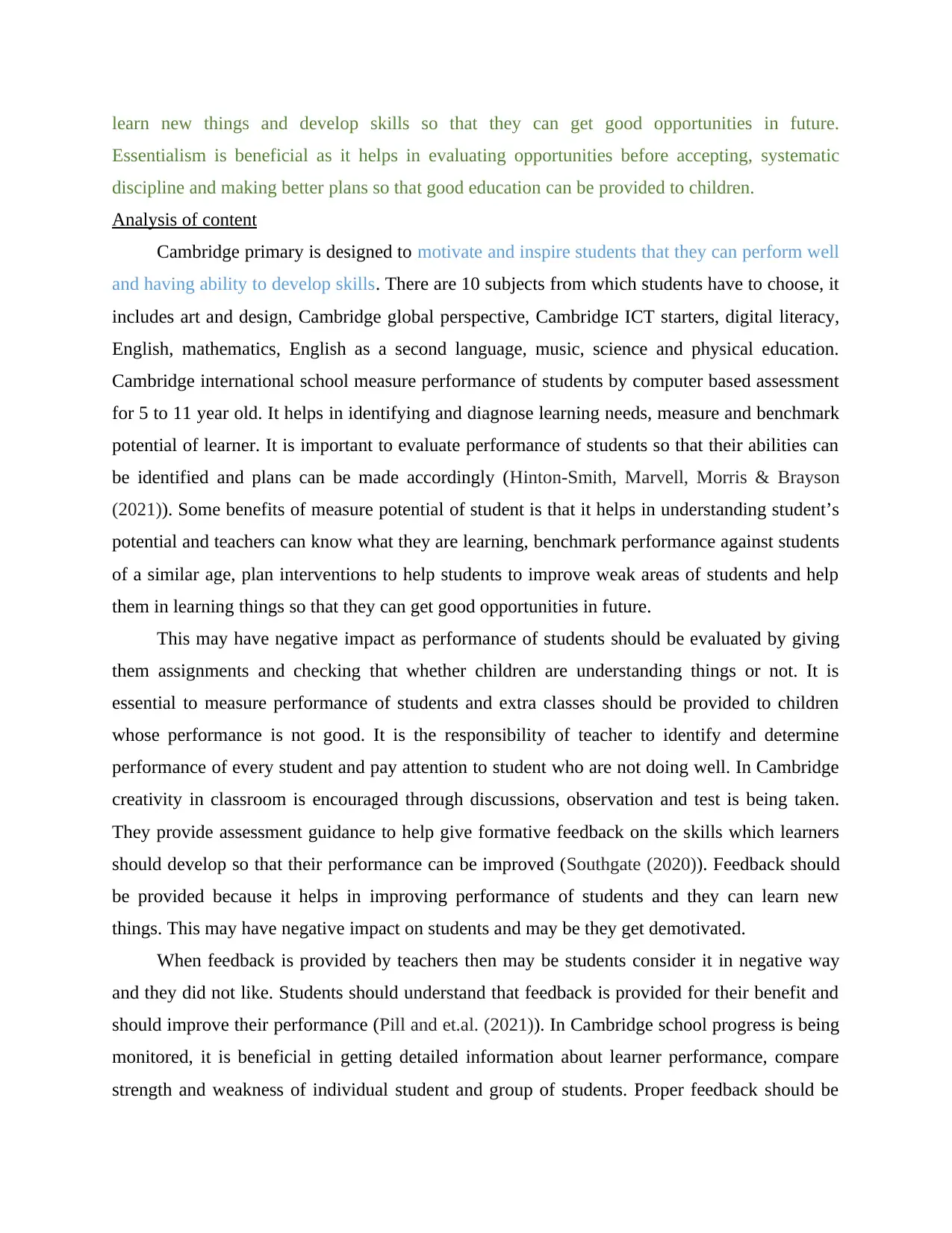
learn new things and develop skills so that they can get good opportunities in future.
Essentialism is beneficial as it helps in evaluating opportunities before accepting, systematic
discipline and making better plans so that good education can be provided to children.
Analysis of content
Cambridge primary is designed to motivate and inspire students that they can perform well
and having ability to develop skills. There are 10 subjects from which students have to choose, it
includes art and design, Cambridge global perspective, Cambridge ICT starters, digital literacy,
English, mathematics, English as a second language, music, science and physical education.
Cambridge international school measure performance of students by computer based assessment
for 5 to 11 year old. It helps in identifying and diagnose learning needs, measure and benchmark
potential of learner. It is important to evaluate performance of students so that their abilities can
be identified and plans can be made accordingly (Hinton-Smith, Marvell, Morris & Brayson
(2021)). Some benefits of measure potential of student is that it helps in understanding student’s
potential and teachers can know what they are learning, benchmark performance against students
of a similar age, plan interventions to help students to improve weak areas of students and help
them in learning things so that they can get good opportunities in future.
This may have negative impact as performance of students should be evaluated by giving
them assignments and checking that whether children are understanding things or not. It is
essential to measure performance of students and extra classes should be provided to children
whose performance is not good. It is the responsibility of teacher to identify and determine
performance of every student and pay attention to student who are not doing well. In Cambridge
creativity in classroom is encouraged through discussions, observation and test is being taken.
They provide assessment guidance to help give formative feedback on the skills which learners
should develop so that their performance can be improved (Southgate (2020)). Feedback should
be provided because it helps in improving performance of students and they can learn new
things. This may have negative impact on students and may be they get demotivated.
When feedback is provided by teachers then may be students consider it in negative way
and they did not like. Students should understand that feedback is provided for their benefit and
should improve their performance (Pill and et.al. (2021)). In Cambridge school progress is being
monitored, it is beneficial in getting detailed information about learner performance, compare
strength and weakness of individual student and group of students. Proper feedback should be
Essentialism is beneficial as it helps in evaluating opportunities before accepting, systematic
discipline and making better plans so that good education can be provided to children.
Analysis of content
Cambridge primary is designed to motivate and inspire students that they can perform well
and having ability to develop skills. There are 10 subjects from which students have to choose, it
includes art and design, Cambridge global perspective, Cambridge ICT starters, digital literacy,
English, mathematics, English as a second language, music, science and physical education.
Cambridge international school measure performance of students by computer based assessment
for 5 to 11 year old. It helps in identifying and diagnose learning needs, measure and benchmark
potential of learner. It is important to evaluate performance of students so that their abilities can
be identified and plans can be made accordingly (Hinton-Smith, Marvell, Morris & Brayson
(2021)). Some benefits of measure potential of student is that it helps in understanding student’s
potential and teachers can know what they are learning, benchmark performance against students
of a similar age, plan interventions to help students to improve weak areas of students and help
them in learning things so that they can get good opportunities in future.
This may have negative impact as performance of students should be evaluated by giving
them assignments and checking that whether children are understanding things or not. It is
essential to measure performance of students and extra classes should be provided to children
whose performance is not good. It is the responsibility of teacher to identify and determine
performance of every student and pay attention to student who are not doing well. In Cambridge
creativity in classroom is encouraged through discussions, observation and test is being taken.
They provide assessment guidance to help give formative feedback on the skills which learners
should develop so that their performance can be improved (Southgate (2020)). Feedback should
be provided because it helps in improving performance of students and they can learn new
things. This may have negative impact on students and may be they get demotivated.
When feedback is provided by teachers then may be students consider it in negative way
and they did not like. Students should understand that feedback is provided for their benefit and
should improve their performance (Pill and et.al. (2021)). In Cambridge school progress is being
monitored, it is beneficial in getting detailed information about learner performance, compare
strength and weakness of individual student and group of students. Proper feedback should be
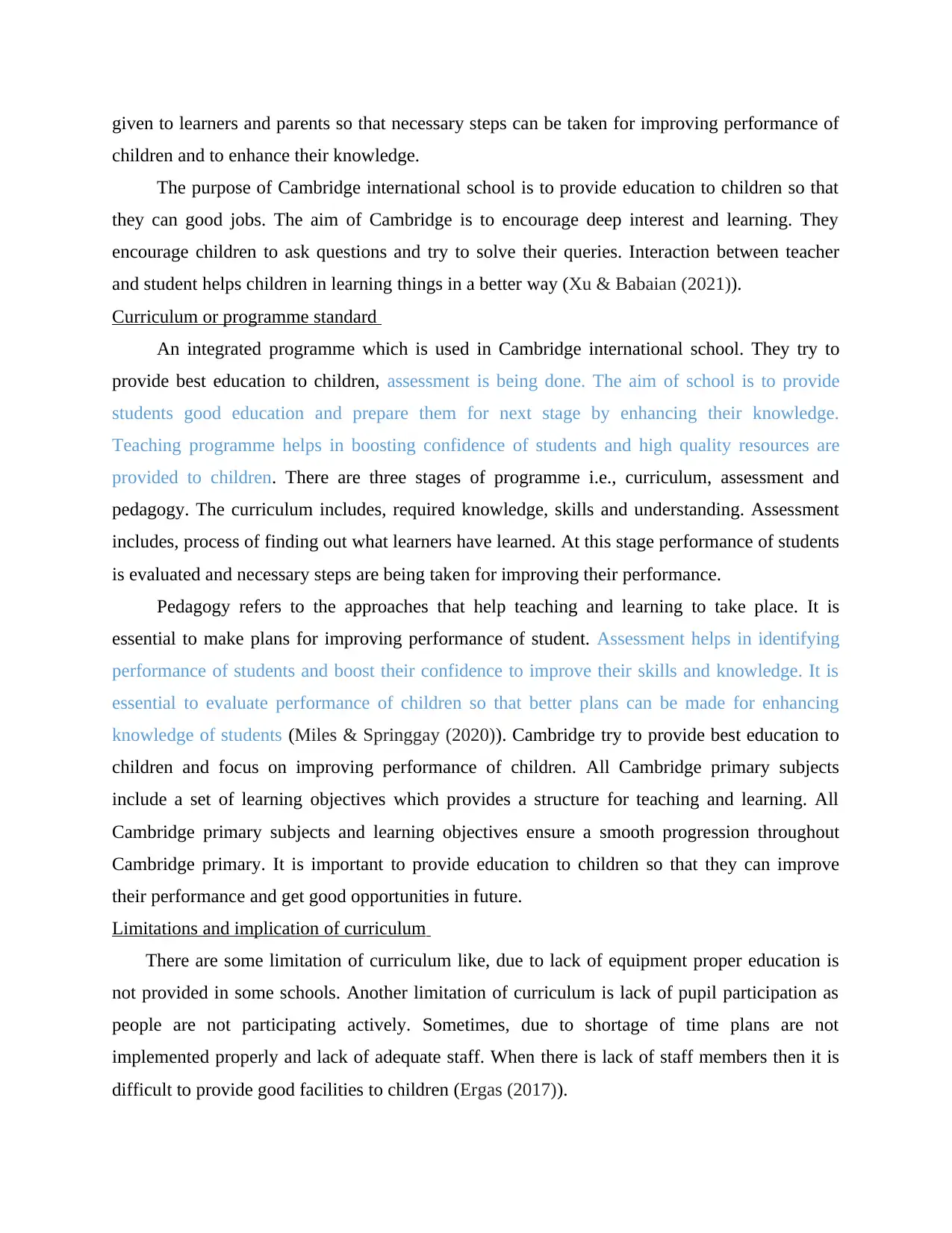
given to learners and parents so that necessary steps can be taken for improving performance of
children and to enhance their knowledge.
The purpose of Cambridge international school is to provide education to children so that
they can good jobs. The aim of Cambridge is to encourage deep interest and learning. They
encourage children to ask questions and try to solve their queries. Interaction between teacher
and student helps children in learning things in a better way (Xu & Babaian (2021)).
Curriculum or programme standard
An integrated programme which is used in Cambridge international school. They try to
provide best education to children, assessment is being done. The aim of school is to provide
students good education and prepare them for next stage by enhancing their knowledge.
Teaching programme helps in boosting confidence of students and high quality resources are
provided to children. There are three stages of programme i.e., curriculum, assessment and
pedagogy. The curriculum includes, required knowledge, skills and understanding. Assessment
includes, process of finding out what learners have learned. At this stage performance of students
is evaluated and necessary steps are being taken for improving their performance.
Pedagogy refers to the approaches that help teaching and learning to take place. It is
essential to make plans for improving performance of student. Assessment helps in identifying
performance of students and boost their confidence to improve their skills and knowledge. It is
essential to evaluate performance of children so that better plans can be made for enhancing
knowledge of students (Miles & Springgay (2020)). Cambridge try to provide best education to
children and focus on improving performance of children. All Cambridge primary subjects
include a set of learning objectives which provides a structure for teaching and learning. All
Cambridge primary subjects and learning objectives ensure a smooth progression throughout
Cambridge primary. It is important to provide education to children so that they can improve
their performance and get good opportunities in future.
Limitations and implication of curriculum
There are some limitation of curriculum like, due to lack of equipment proper education is
not provided in some schools. Another limitation of curriculum is lack of pupil participation as
people are not participating actively. Sometimes, due to shortage of time plans are not
implemented properly and lack of adequate staff. When there is lack of staff members then it is
difficult to provide good facilities to children (Ergas (2017)).
children and to enhance their knowledge.
The purpose of Cambridge international school is to provide education to children so that
they can good jobs. The aim of Cambridge is to encourage deep interest and learning. They
encourage children to ask questions and try to solve their queries. Interaction between teacher
and student helps children in learning things in a better way (Xu & Babaian (2021)).
Curriculum or programme standard
An integrated programme which is used in Cambridge international school. They try to
provide best education to children, assessment is being done. The aim of school is to provide
students good education and prepare them for next stage by enhancing their knowledge.
Teaching programme helps in boosting confidence of students and high quality resources are
provided to children. There are three stages of programme i.e., curriculum, assessment and
pedagogy. The curriculum includes, required knowledge, skills and understanding. Assessment
includes, process of finding out what learners have learned. At this stage performance of students
is evaluated and necessary steps are being taken for improving their performance.
Pedagogy refers to the approaches that help teaching and learning to take place. It is
essential to make plans for improving performance of student. Assessment helps in identifying
performance of students and boost their confidence to improve their skills and knowledge. It is
essential to evaluate performance of children so that better plans can be made for enhancing
knowledge of students (Miles & Springgay (2020)). Cambridge try to provide best education to
children and focus on improving performance of children. All Cambridge primary subjects
include a set of learning objectives which provides a structure for teaching and learning. All
Cambridge primary subjects and learning objectives ensure a smooth progression throughout
Cambridge primary. It is important to provide education to children so that they can improve
their performance and get good opportunities in future.
Limitations and implication of curriculum
There are some limitation of curriculum like, due to lack of equipment proper education is
not provided in some schools. Another limitation of curriculum is lack of pupil participation as
people are not participating actively. Sometimes, due to shortage of time plans are not
implemented properly and lack of adequate staff. When there is lack of staff members then it is
difficult to provide good facilities to children (Ergas (2017)).
⊘ This is a preview!⊘
Do you want full access?
Subscribe today to unlock all pages.

Trusted by 1+ million students worldwide
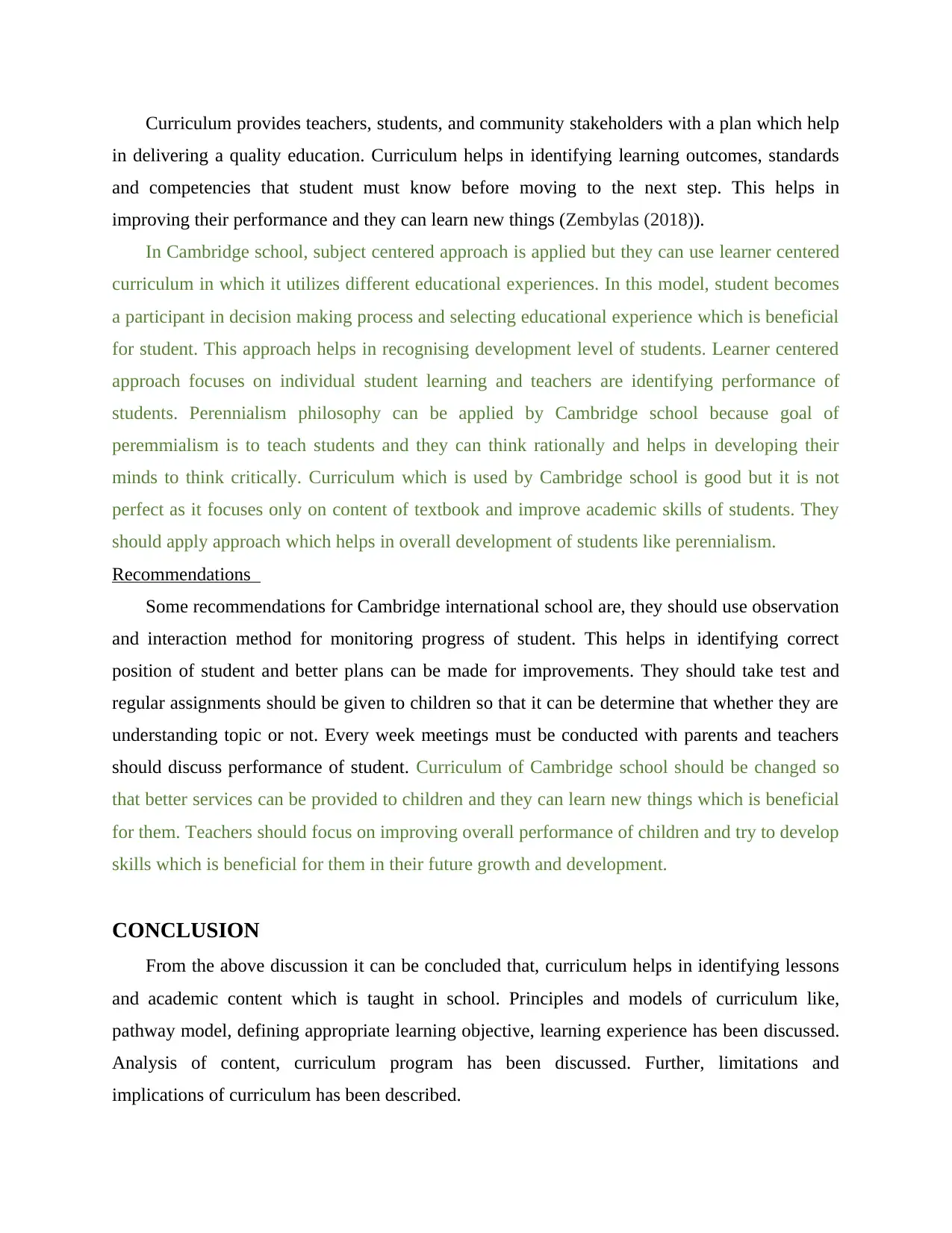
Curriculum provides teachers, students, and community stakeholders with a plan which help
in delivering a quality education. Curriculum helps in identifying learning outcomes, standards
and competencies that student must know before moving to the next step. This helps in
improving their performance and they can learn new things (Zembylas (2018)).
In Cambridge school, subject centered approach is applied but they can use learner centered
curriculum in which it utilizes different educational experiences. In this model, student becomes
a participant in decision making process and selecting educational experience which is beneficial
for student. This approach helps in recognising development level of students. Learner centered
approach focuses on individual student learning and teachers are identifying performance of
students. Perennialism philosophy can be applied by Cambridge school because goal of
peremmialism is to teach students and they can think rationally and helps in developing their
minds to think critically. Curriculum which is used by Cambridge school is good but it is not
perfect as it focuses only on content of textbook and improve academic skills of students. They
should apply approach which helps in overall development of students like perennialism.
Recommendations
Some recommendations for Cambridge international school are, they should use observation
and interaction method for monitoring progress of student. This helps in identifying correct
position of student and better plans can be made for improvements. They should take test and
regular assignments should be given to children so that it can be determine that whether they are
understanding topic or not. Every week meetings must be conducted with parents and teachers
should discuss performance of student. Curriculum of Cambridge school should be changed so
that better services can be provided to children and they can learn new things which is beneficial
for them. Teachers should focus on improving overall performance of children and try to develop
skills which is beneficial for them in their future growth and development.
CONCLUSION
From the above discussion it can be concluded that, curriculum helps in identifying lessons
and academic content which is taught in school. Principles and models of curriculum like,
pathway model, defining appropriate learning objective, learning experience has been discussed.
Analysis of content, curriculum program has been discussed. Further, limitations and
implications of curriculum has been described.
in delivering a quality education. Curriculum helps in identifying learning outcomes, standards
and competencies that student must know before moving to the next step. This helps in
improving their performance and they can learn new things (Zembylas (2018)).
In Cambridge school, subject centered approach is applied but they can use learner centered
curriculum in which it utilizes different educational experiences. In this model, student becomes
a participant in decision making process and selecting educational experience which is beneficial
for student. This approach helps in recognising development level of students. Learner centered
approach focuses on individual student learning and teachers are identifying performance of
students. Perennialism philosophy can be applied by Cambridge school because goal of
peremmialism is to teach students and they can think rationally and helps in developing their
minds to think critically. Curriculum which is used by Cambridge school is good but it is not
perfect as it focuses only on content of textbook and improve academic skills of students. They
should apply approach which helps in overall development of students like perennialism.
Recommendations
Some recommendations for Cambridge international school are, they should use observation
and interaction method for monitoring progress of student. This helps in identifying correct
position of student and better plans can be made for improvements. They should take test and
regular assignments should be given to children so that it can be determine that whether they are
understanding topic or not. Every week meetings must be conducted with parents and teachers
should discuss performance of student. Curriculum of Cambridge school should be changed so
that better services can be provided to children and they can learn new things which is beneficial
for them. Teachers should focus on improving overall performance of children and try to develop
skills which is beneficial for them in their future growth and development.
CONCLUSION
From the above discussion it can be concluded that, curriculum helps in identifying lessons
and academic content which is taught in school. Principles and models of curriculum like,
pathway model, defining appropriate learning objective, learning experience has been discussed.
Analysis of content, curriculum program has been discussed. Further, limitations and
implications of curriculum has been described.
Paraphrase This Document
Need a fresh take? Get an instant paraphrase of this document with our AI Paraphraser
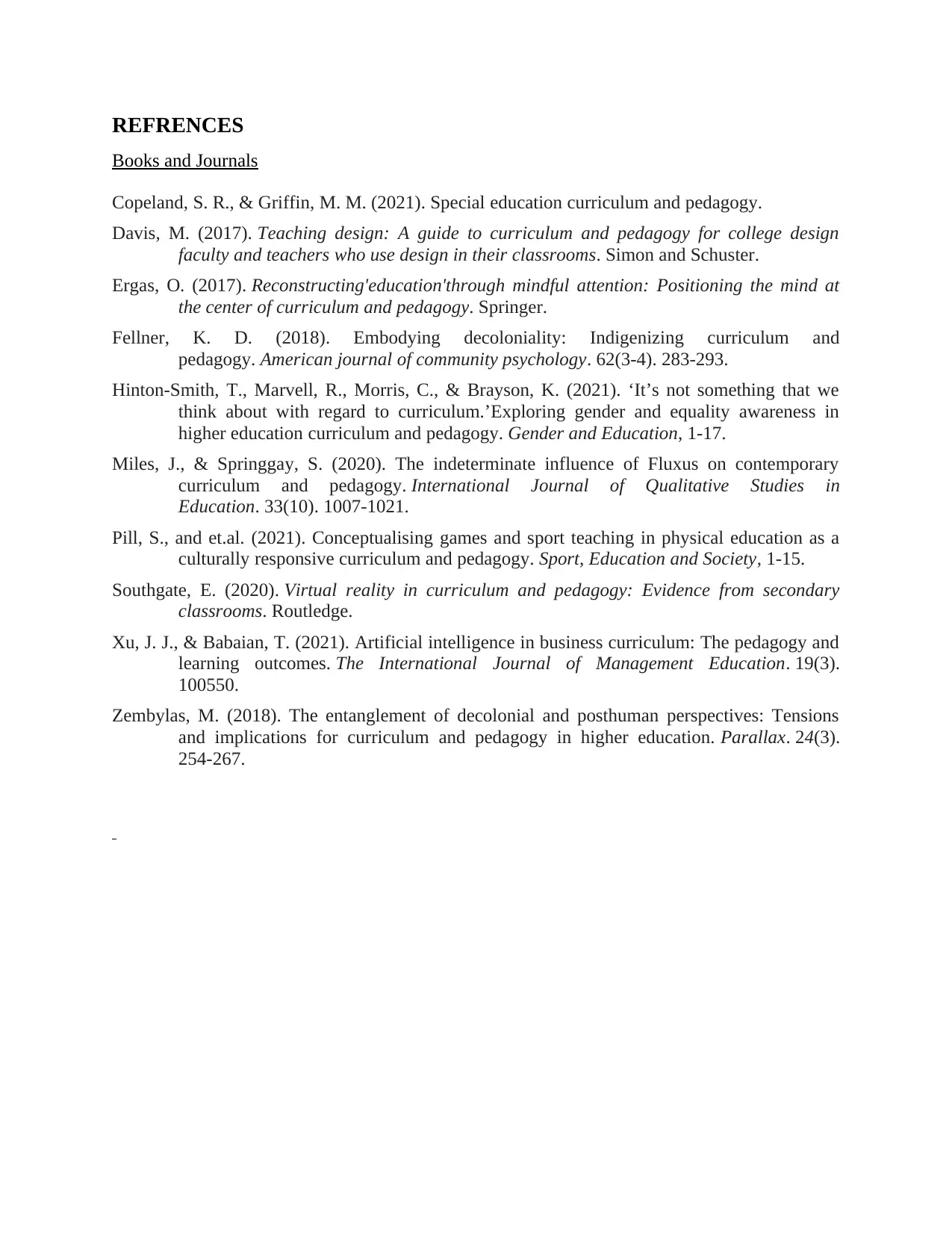
REFRENCES
Books and Journals
Copeland, S. R., & Griffin, M. M. (2021). Special education curriculum and pedagogy.
Davis, M. (2017). Teaching design: A guide to curriculum and pedagogy for college design
faculty and teachers who use design in their classrooms. Simon and Schuster.
Ergas, O. (2017). Reconstructing'education'through mindful attention: Positioning the mind at
the center of curriculum and pedagogy. Springer.
Fellner, K. D. (2018). Embodying decoloniality: Indigenizing curriculum and
pedagogy. American journal of community psychology. 62(3-4). 283-293.
Hinton-Smith, T., Marvell, R., Morris, C., & Brayson, K. (2021). ‘It’s not something that we
think about with regard to curriculum.’Exploring gender and equality awareness in
higher education curriculum and pedagogy. Gender and Education, 1-17.
Miles, J., & Springgay, S. (2020). The indeterminate influence of Fluxus on contemporary
curriculum and pedagogy. International Journal of Qualitative Studies in
Education. 33(10). 1007-1021.
Pill, S., and et.al. (2021). Conceptualising games and sport teaching in physical education as a
culturally responsive curriculum and pedagogy. Sport, Education and Society, 1-15.
Southgate, E. (2020). Virtual reality in curriculum and pedagogy: Evidence from secondary
classrooms. Routledge.
Xu, J. J., & Babaian, T. (2021). Artificial intelligence in business curriculum: The pedagogy and
learning outcomes. The International Journal of Management Education. 19(3).
100550.
Zembylas, M. (2018). The entanglement of decolonial and posthuman perspectives: Tensions
and implications for curriculum and pedagogy in higher education. Parallax. 24(3).
254-267.
Books and Journals
Copeland, S. R., & Griffin, M. M. (2021). Special education curriculum and pedagogy.
Davis, M. (2017). Teaching design: A guide to curriculum and pedagogy for college design
faculty and teachers who use design in their classrooms. Simon and Schuster.
Ergas, O. (2017). Reconstructing'education'through mindful attention: Positioning the mind at
the center of curriculum and pedagogy. Springer.
Fellner, K. D. (2018). Embodying decoloniality: Indigenizing curriculum and
pedagogy. American journal of community psychology. 62(3-4). 283-293.
Hinton-Smith, T., Marvell, R., Morris, C., & Brayson, K. (2021). ‘It’s not something that we
think about with regard to curriculum.’Exploring gender and equality awareness in
higher education curriculum and pedagogy. Gender and Education, 1-17.
Miles, J., & Springgay, S. (2020). The indeterminate influence of Fluxus on contemporary
curriculum and pedagogy. International Journal of Qualitative Studies in
Education. 33(10). 1007-1021.
Pill, S., and et.al. (2021). Conceptualising games and sport teaching in physical education as a
culturally responsive curriculum and pedagogy. Sport, Education and Society, 1-15.
Southgate, E. (2020). Virtual reality in curriculum and pedagogy: Evidence from secondary
classrooms. Routledge.
Xu, J. J., & Babaian, T. (2021). Artificial intelligence in business curriculum: The pedagogy and
learning outcomes. The International Journal of Management Education. 19(3).
100550.
Zembylas, M. (2018). The entanglement of decolonial and posthuman perspectives: Tensions
and implications for curriculum and pedagogy in higher education. Parallax. 24(3).
254-267.
1 out of 8
Related Documents
Your All-in-One AI-Powered Toolkit for Academic Success.
+13062052269
info@desklib.com
Available 24*7 on WhatsApp / Email
![[object Object]](/_next/static/media/star-bottom.7253800d.svg)
Unlock your academic potential
Copyright © 2020–2026 A2Z Services. All Rights Reserved. Developed and managed by ZUCOL.





